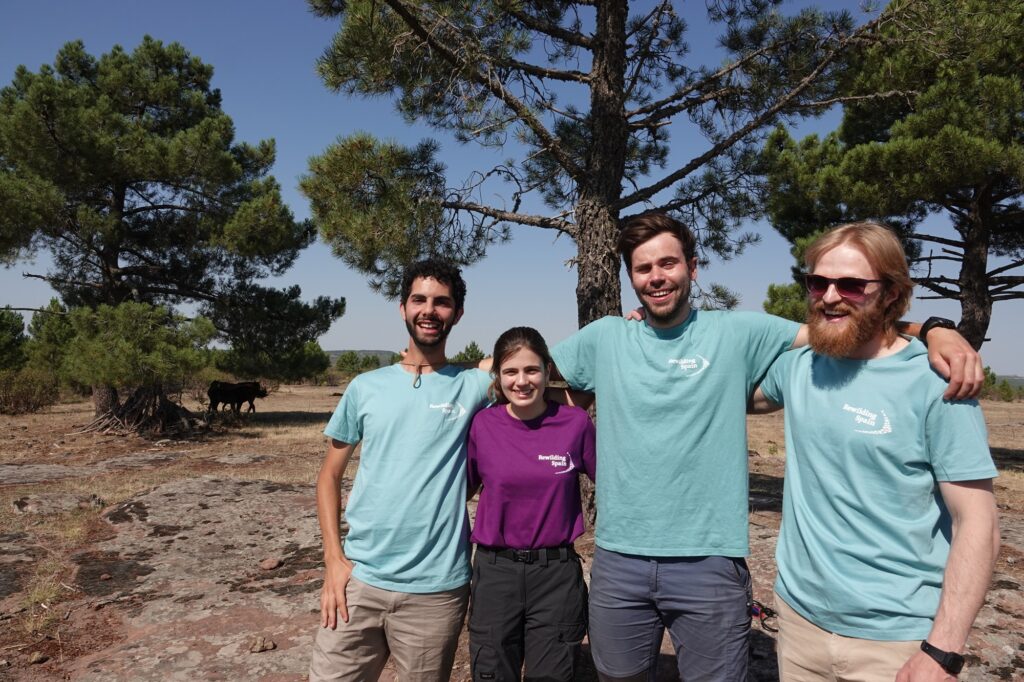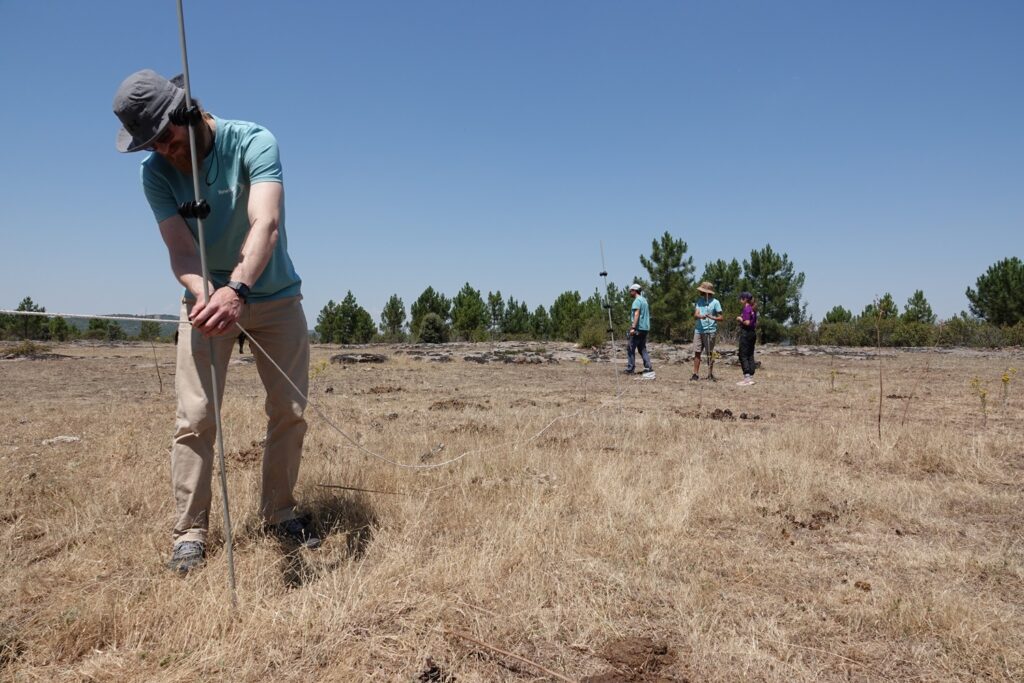Volunteering is a valuable way to join the rewilding movement and contribute in a practical and active way to nature recovery. In the Iberian Highlands, four young people coming from Spain, Belgium, Switzerland and Lithuania were the first to join Rewilding Spain’s newly launched Volunteer Programme this summer.

Through this programme, the volunteers have participated in field tasks that are part of the day-to-day work of the Rewilding Spain team in the area, such as setting up camera traps to monitor wildlife, supervising and recording horses and tauros behaviour in Mazarete and Villanueva de Alcorón (Alto Tajo region), and electric fences maintenance.
From a practical point of view, the volunteers’ involvement allows for faster progress in various tasks, but the importance of their participation goes beyond that. Their stay in the landscape has allowed these young people to get to know rewilding in greater depth, to understand how it can contribute to mitigating the major environmental problems of our time and to consider rewilding as a potential field for their professional practice in the future. In short, to become rewilders.
This is the case of Jonay Andrés Naranjo, a young Spanish recent graduate in Environmental Sciences who wants his future work to be linked to nature. After reading ‘Rewilding Iberia. Exploring the potential of renaturation in Spain’, the book (in Spanish) by Jordi Palau, Jonay became interested in the “active approach to rewilding”. That’s why for his first experience as a volunteer, Jonay looked for and found an initiative that “could have a direct impact on my country”. And so is how he arrived at the Iberian Highlands.
In Belgium, Hera Heytens, a 23-year-old Master’s student in forests and nature conservation, wanted to learn more about rewilding and gather information for her potential thesis. Hera thought that that having a volunteering experience was a good way to achieve this goal. Once in the field, she has also seen fulfilled her wish to live this period “in a place where people are friendly and welcoming and I can learn from a team that is so passionate about their work”.

Getting involved specifically in rewilding was also the goal of Martynas Jockus, a young Lithuanian man who, unlike his peers, has a political science background and works for a human rights organisation. For Martynas, who has been staying at the rural hostel Finca de Solanillos, managed by Apadrina un Árbol Foundation (Mazarete, Guadalajara), joining this programme has been an opportunity to practice Spanish, learn about the history of the landscape and live an experience that he recommends both to those with a background in nature-related subjects and to those working in other fields. “To people who may not have thought about volunteering in the field of nature or rewilding, I would tell them to come, because this experience will provide them with a different and stimulating challenge that helps you to reflect on what you want. For me it has also helped to escape from the office and reconnect with myself through nature”.
Simon Carlier, a Swiss man trained in IT, neither comes from the academic field of nature, though conservation might open a new door for him in life. A keen cyclist, Simon had arrived in Spain some days before joining the programme, after cycling the 2,000 kilometres that separate our country from his place. At the end of the agreed month’s stay, he highlights the “opportunity to get involved in a rewilding initiative in the early stages, as well as getting to know the local people, the local culture, practising Spanish and riding in the area after work.”
Over 50 applications received
Running the new volunteer programme has also been an exciting challenge for the Rewilding Spain team, with over 50 applications from all over the world received since the launch last spring. Andrea Hernández is the programme coordinator and is in charge of the selection and welcome process, as well as all the logistical aspects necessary to ensure a positive experience for the volunteers and a positive impact on the landscape. Volunteers are supported with accommodation, transport, insurance coverage and all the practical information they may need during their stay.
“Volunteers and interns not only bring value to Rewilding Spain, but their stay also helps to boost the economy of the area,” highlights Andrea. “They stay in our villages, go shopping here and visit places of interest in their spare time. In some cases, family or friends also come to visit them, thus favouring sustainable nature tourism”, se explains. “When they leave, we hope that all the volunteers will also become Iberian Highlands’ ambassadors in the rest of Spain and around the world.”
Rewilding Spain’s Volunteer Programme is also open to university or master’s degree internships, that can be advised by the Rewilding Spain’s professionals.
The programme runs from February to November. People interested in participating can find more information and the application form here.
